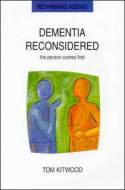Well we've been working on this now for 20-30 years look at the progress we've made. ...
Time is always there to remind you:
Hey, just who are you trying to fool?
You are a lifelong learner!
Hey, just who are you trying to fool?
You are a lifelong learner!
The number of personnel and services that describe themselves as person-centred is an ongoing theme of so many CVs, policies, SLAs, commissioning and consultant's presentations and lectures. ...
Whether in a ward, service, or organisation's philosophy, person-centred is a term that is being diluted to the extent that semantic inflation devalues what is supposed to be the main currency? Or are we admitting that this is the cost of the political games that people play? Whatever your view, there are insights of progress won, but also reminders on how much remains to be done.
Health and social care being multicontextual demands the existence of multiple currencies. One additional currency begs that we compare A, B, C with the evidence base.
If this is the crucible of our person-centred times then what is burning?
- Nursing ethics?
- Nursing education?
- Idealistic aspiration? (Yes, we will get there!)
- New Age incense?
- Policy initiatives?
- Funding allocations?
- Nursing activism (Or, are there any balls in the house)?
- Service infrastructures?
For women who suffer a miscarriage - where should they be nursed as debated in today's Guardian newspaper? What is person-centred care in maternity and gynaecology services?
In-patient provision and transitions from child-youth-adult provide other opportunities and major challenges for health and social care to demonstrate their person-centredness.
There are so many ways to be person-centred, so many levels, some may even be contradictory(?).

I wonder how many of those people highlighted in the Francis Report also had a form of dementia - whether diagnosed or not? Personhood and the need to acknowledge and sustain the person are not new.
Even if a service is person-centred in terms of the environment, meal choices, therapeutic options, belongings, personal space, proximity to home and relatives ... the crux at the center is the attitude of staff, and their having the time and space:
"to be"
person-centred
Additional links:
Mumsnet
Atkins, L. (2010) NHS 'must lessen trauma of miscarriages' Parents web forum Mumsnet calls for new code of practice to help women who lose their babies, The Guardian, Tuesday 2 March.
Image source:
http://drugsreference.co.uk/books/books.php?cat2=Caregiving